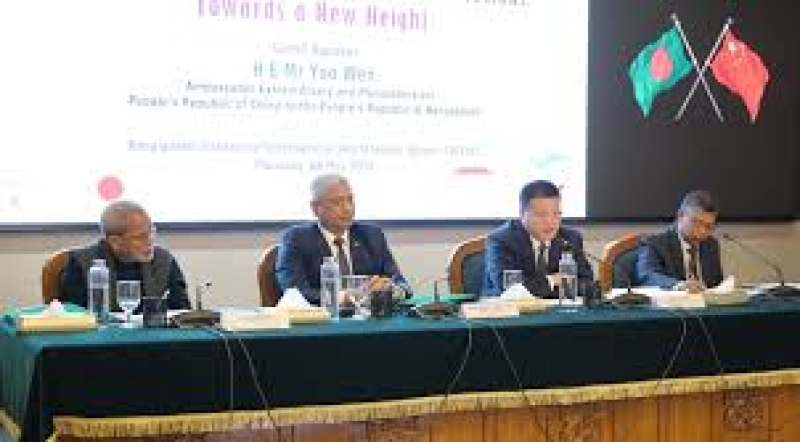- US Issues Travel Alert for Bangladesh Ahead of Election |
- Air ambulance carrying bullet-hit Hadi flies for Singapore |
- Can Dhaka’s arms recovery drive ensure peaceful polls? |
- ‘Unhealthy’ air quality recorded in Dhaka Monday morning |
- BD peacekeepers' deaths: UN chief calls Dr. Yunus, offers condolence |
China Not Linked to Corridor, Backs Teesta Project: Envoy

Chinese Ambassador to Bangladesh Yao Wen on Thursday clarified that China has no involvement in the "so-called humanitarian corridor" concerning Myanmar’s Rakhine State, reaffirming Beijing’s unwavering respect for national sovereignty and territorial integrity.
“Regarding the issue of the so-called humanitarian corridor, I must clarify that China is not involved,” Ambassador Yao stated while responding to questions following a country lecture hosted by the Bangladesh Institute of International and Strategic Studies (BIISS) in Dhaka.
He explained that, to his knowledge, the initiative is led by United Nations agencies aimed at delivering humanitarian assistance to conflict-affected communities in Rakhine, and that China has no role in the process.
Reiterating China’s long-standing policy of non-interference, the envoy expressed hope that Bangladesh and Myanmar would resolve the Rohingya crisis through peaceful dialogue and resume the repatriation process.
Turning to the proposed Teesta River Comprehensive Management and Restoration Project (TRCMRP), Ambassador Yao underscored China’s readiness to support the initiative. He cited the joint media statement issued following the bilateral meeting between Chief Adviser Professor Muhammad Yunus and Chinese President Xi Jinping in Beijing, in which Bangladesh welcomed Chinese participation.
“China remains ready. We are willing to offer our help. Now it is up to Bangladesh to decide whether it wants to move forward,” he said.
When asked about the potential framework for project implementation—whether bilaterally, trilaterally, or through an international consortium—Ambassador Yao emphasized that the decision lies entirely with Bangladesh. “China will respect whatever decision Bangladesh makes. I sincerely hope the project can begin soon,” he added.
In his lecture, titled ‘Five Decades of Bangladesh-China Relations: Towards a New Height’, the ambassador highlighted China’s commitment to a multi-polar world rooted in sovereign equality.
“Every country, regardless of size, strength, or wealth, deserves full respect for its sovereignty and dignity,” he said, stressing that all nations have the right to determine their own development paths and systems without external interference.
He praised the longstanding mutual respect in China-Bangladesh relations, noting, “As an independent sovereign state, Bangladesh must be free from outside intervention. China has always firmly supported Bangladesh in defending its independence, sovereignty, and national dignity.”
He also acknowledged Bangladesh’s firm adherence to the One-China policy and its consistent opposition to “Taiwan independence.”
“China-Bangladesh ties have withstood global uncertainty and domestic changes in both countries, growing stronger with time,” he noted, attributing this strength to mutual respect and equality—principles he described as “the secret ingredient” of the relationship.
Looking ahead, Ambassador Yao announced that Chinese Minister of Commerce Wang Wentao will visit Bangladesh later this month, leading the largest-ever Chinese business delegation to the country. The delegation will include more than 100 investors and entrepreneurs.
A trade and investment exchange event will be co-hosted by both countries during the visit, bringing together hundreds of Chinese and Bangladeshi enterprises to explore new avenues of cooperation. In addition, the 15th meeting of the Bangladesh-China Joint Economic and Trade Commission will be held to identify concrete steps for deepening bilateral economic ties.
BIISS Director General Major General Iftekhar Anis delivered the welcome address at the event, which was chaired by BIISS Chairman AFM Gousal Azam Sarker. Professor Imtiaz Ahmed, Executive Director of the Centre for Alternatives, also gave a presentation.

